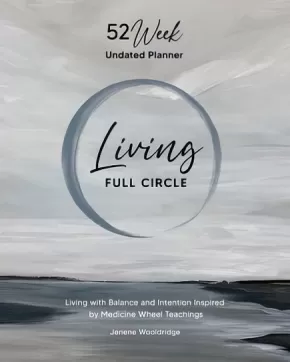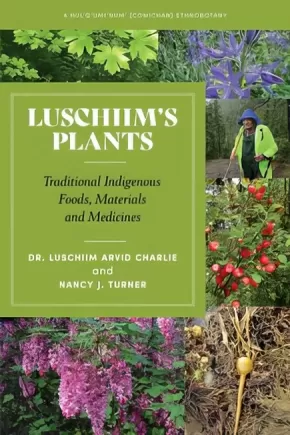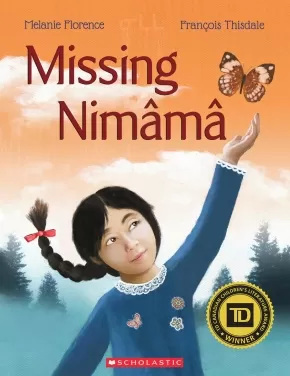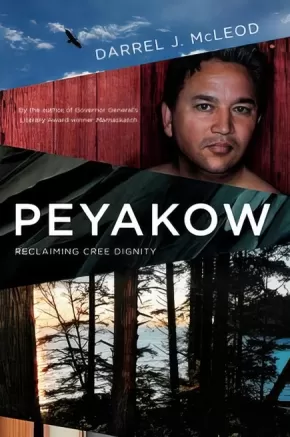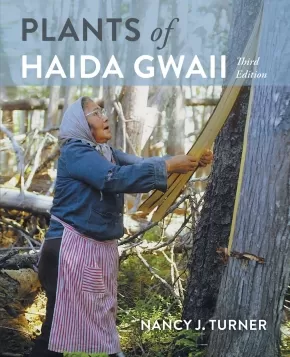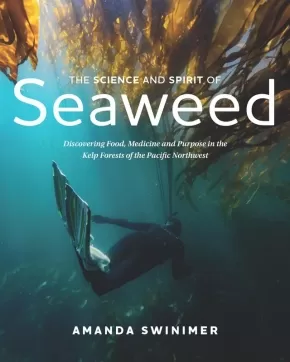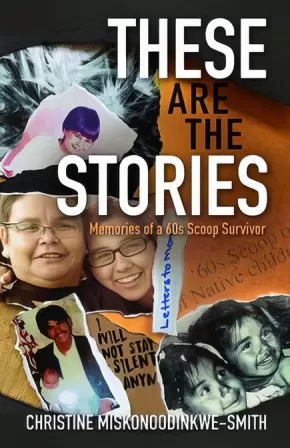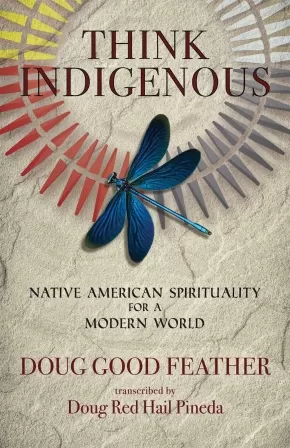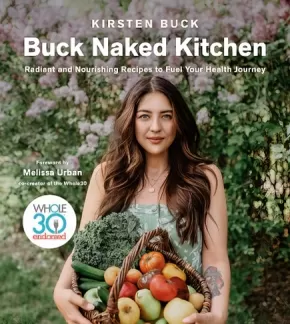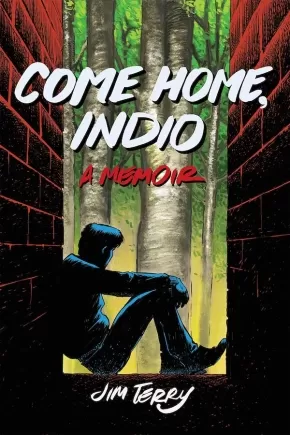
Healing and Wellness
106
-
120
of
222 Results;
Sort By
Go To
of 15
Living Full Circle: Living with Balance and Intention Inspired by Medicine Wheel Teachings
$29.95
Format:
Hardcover
Text Content Territories:
Indigenous Canadian;
Reading Level: N/A
ISBN / Barcode: 9781773660936
Synopsis:
Synopsis:
PLAN YOUR YEAR WITH THE LIVING FULL CIRCLE PLANNER. In this planner, author Jenene Wooldridge shares her insights and personal experience on how she incorporates teachings of the medicine wheel around balance and living with purpose to live her life and achieve success. She shares the importance of contemplation, preparation, goals and how they connect to Living Full Circle.
Discover what works for you, develop healthy habits and create goals with intention to live your best. With twelve themed months and 52 weeks of guided reflection, this planner provides a foundation for your ideal life. Track your progress and learn from its useful tips and inspiration as you grow.
• Created by you, for you!
• Delivers clarity for daily living
• Guided reflection to increase self-awareness and productivity
• Goal setting, habit tracking and intentional living
Educator Information
52 Week Undated Planner
Additional Information
160 pages | 8.00" x 10.00"
Luschiim’s Plants: Traditional Indigenous Foods, Materials and Medicines: A Hul′q′umi′num′ (Cowichan) Ethnobotany
$29.95
Format:
Paperback
Text Content Territories:
Indigenous Canadian; First Nations; Salish; Coast Salish; Cowichan;
ISBN / Barcode: 9781550179453
Synopsis:
Synopsis:
Luschiim’s Plants: A Guide to Traditional Indigenous Foods, Materials and Medicines is an invaluable compendium of Hul′q′umi′num′ traditional knowledge.
Respected Cowichan Tribe Elder and botanical expert Luschiim, Arvid Charlie, began his education in early childhood, learning from his great grandparents and others of their generation. Luschiim’s Plants represents his dedication to the survival of the Hul′q′umi′num′ language and traditional knowledge of plants for future generations. From the healing properties of qaanlhp (arbutus) to the many practical applications of q’am (bull kelp), the information presented in this remarkable guide shares knowledge of plants that Luschiim is familiar with through his own Elders’ teachings and by way of direct experience over the course of his lifetime, and compiled from field outings and interviews with notable ethnobiologist and botanist Nancy J. Turner.
In this unprecedented collection of botanical information, over 140 plants are categorized within their broad botanical groupings: algae and seaweeds, lichens, fungi and mushrooms, mosses and liverworts, ferns and fern-allies, coniferous trees, deciduous trees, shrubs and vines, and herbaceous flowering plants. Each entry is illustrated with a colour photo and includes the plant’s common, scientific and Hul′q′umi′num′ names; a short description; where to find it; and cultural knowledge related to the plant. Additional notes encompass plant use, safety and conservation; the linguistic writing system used for Hul′q′umi′num′ plant names; as well as miscellaneous notes from interviews with Luschiim.
This volume is an important addition to the bookshelves of botanists, and will fascinate anyone with an interest in plants of the West Coast and their traditional uses by Coast Salish peoples.
In this unprecedented collection of botanical information, over 140 plants are categorized within their broad botanical groupings: algae and seaweeds, lichens, fungi and mushrooms, mosses and liverworts, ferns and fern-allies, coniferous trees, deciduous trees, shrubs and vines, and herbaceous flowering plants. Each entry is illustrated with a colour photo and includes the plant’s common, scientific and Hul′q′umi′num′ names; a short description; where to find it; and cultural knowledge related to the plant. Additional notes encompass plant use, safety and conservation; the linguistic writing system used for Hul′q′umi′num′ plant names; as well as miscellaneous notes from interviews with Luschiim.
This volume is an important addition to the bookshelves of botanists, and will fascinate anyone with an interest in plants of the West Coast and their traditional uses by Coast Salish peoples.
Educator Information
This resource is in English with additional notes that encompass the linguistic writing system used for Hul′q′umi′num′ plant names.
This resource is in English with additional notes that encompass the linguistic writing system used for Hul′q′umi′num′ plant names.
Additional Information
288 pages | 6.00" x 9.00"
288 pages | 6.00" x 9.00"
Missing Nimâmâ
$8.99
Artists:
Format:
Hardcover
Text Content Territories:
Indigenous Canadian; First Nations; Cree (Nehiyawak);
ISBN / Barcode: 9781039708181
Synopsis:
Synopsis:
A beautiful, transcendent story of a mother-daughter connection that persists through tragedy and across time.
Kateri is a young Cree girl, growing up in the care of her grandmother. We see her reaching important milestones: her first day of school, first dance, first date, wedding, first child. Her mother is absent, but not gone, watching her child growing up without her.
Told in alternating voices of child and mother, Missing Nimâmâ is a story of love, loss, and acceptance, showing the human side of a national tragedy. Dreamlike illustrations by François Thisdale enrich Kateri’s emotional journey. An afterword by the author provides a simple, age-appropriate context for young readers. Includes Cree words and glossary.
Reviews
"A free-verse intergenerational story of separation, loss, and daughter-mother connection amid the ongoing crisis of missing First Nations girls and women. . . On each page, Cree author Florence presents two narratives: Kateri's and her missing nimâmâ's. By juxtaposing the daughter's and mother's thoughts and feelings in complementary verse, Florence provides them the opportunity to experience life together from their respective points of view and to talk to each other from a distance. Thisdale's soft-edged, wistful artwork enriches the heartfelt story, strongly capturing the passage of time and Kateri's emotional journey. An afterword is appended, offering simple and relevant information as well as statistics of missing and murdered indigenous girls and women; together with the story, it should help to begin a conversation with young readers. A solid debut picture book that works as a record of voices that are usually unheard, ignored, and forgotten." — Kirkus Reviews
"A touching story related from the point of view of a missing indigenous woman as she watches her daughter grow up without her."— Quill and Quire
Awards
- TD Canadian Children's Literature Award Winner
Educator Information
This is a picture book best suited for more mature readers, as it deals with mature themes and subject matter. It's best used for a read-aloud due to its subject matter and theme of loss. This book is not recommended as an independent read for younger ages.
Additional Information
32 pages | 8.50" x 11.00"
Peyakow: Reclaiming Cree Dignity, A Memoir
$29.95
Format:
Hardcover
Text Content Territories:
Indigenous Canadian; First Nations; Cree (Nehiyawak);
Grade Levels: 12; University/College;
ISBN / Barcode: 9781771622318
Synopsis:
Synopsis:
Mamaskatch, Darrel J. McLeod’s 2018 memoir of growing up Cree in Northern Alberta, was a publishing sensation—winning the Governor General's Literary Award for Non-Fiction, shortlisted for many other major prizes and translated into French and German editions. In Peyakow, McLeod continues the poignant story of his impoverished youth, beset by constant fears of being dragged down by the self-destruction and deaths of those closest to him as he battles the bullying of white classmates, copes with the trauma of physical and sexual abuse, and endures painful separation from his family and culture. With steely determination, he triumphs: now elementary teacher; now school principal; now head of an Indigenous delegation to the UN in Geneva; now executive in the Government of Canada—and now a celebrated author.
Brutally frank but buoyed throughout by McLeod’s unquenchable spirit, Peyakow—a title borrowed from the Cree word for “one who walks alone”—is an inspiring account of triumph against unimaginable odds. McLeod’s perspective as someone whose career path has crossed both sides of the Indigenous/white chasm resonates with particular force in today’s Canada.
Reviews
"Bravo! A job well done. You, my friend, are a very good writer." — Tomson Highway, February 2021
"This is the story of the remarkable professional life of a remarkable man. Whatever he worked on, including such important government files as the Nisga’a and Dene land settlements, he started out and remained a fierce champion of Indigenous rights. Wherever he travelled, he carried with him his past, the joys and tragedies of his own family, and the dignity and courage of his Cree ancestors. The book is a story of triumph, made particularly moving because McLeod doesn’t hide the demons he wrestles with as a two-spirited and Indigenous man." — Lorna Crozier, author of Through the Garden, February 2021
"McLeod boldly reconnects and reflects upon decades of lived experiences from familial, Cree traditional life of living off the land, to a professional (ultimately international) life dedicated to Indigenous rights and wellbeing. By reconnecting stories torn apart by poverty, tragic deaths, racism, homophobia and bureaucratic white privilege, McLeod performs a sacred act." — Betsy Warland, author of Oscar of Between, February 2021
Additional Information
240 pages | 6.00" x 9.00" | 8-page photo insert
Plants of Haida Gwaii: Third Edition
$29.95
Format:
Paperback
Text Content Territories:
Indigenous Canadian; First Nations; Haida;
ISBN / Barcode: 9781550179149
Synopsis:
Synopsis:
For many thousands of years the lands and waters of Haida Gwaii have been home to the Haida. Plants of Haida Gwaii, written with the cooperation and collaboration of Haida knowledge holders and botanical experts, is a detailed and insightful record of the traditional uses of over 150 species of native plants. Moreover, it explains the systems of knowledge and understanding that enabled the Haida to use the resources of their islands sustainably from one generation to the next over millennia.
The Haida names of these plants indicate their importance, as do the many narratives featuring them. From the ts’uu—massive western red-cedars—of the forests which provide wood used for canoes, house posts, poles and boxes, and bark carefully harvested for weaving mats, baskets and hats, to the ngaal—tough, resilient fronds of giant kelp—used to harvest herring eggs, the botanical species used by the Haida are found from the ocean to the mountain tops, and are as important today as ever before. With over 250 photographs and illustrations, this book is both beautiful and informative.
Additional Information
272 pages | 7.50" x 9.25"
Authenticity Note: As there are contributions from Haida knowledge holders, this work has been labelled as containing authentic Indigenous text. It is up to readers to determine if this work is authentic for their purposes.
The Science and Spirit of Seaweed: Discovering Food, Medicine and Purpose in the Kelp Forests of the Pacific Northwest
$28.95
Format:
Paperback
ISBN / Barcode: 9781550179613
Synopsis:
Synopsis:
Sustainable Pacific Northwest-based seaweed harvester Amanda Swinimer describes the ecology, culinary uses, evidence-based health benefits and climate change-resisting potential of seaweed and shares highlights from her remarkable life beneath the waves.
Related to the most ancient living organisms on earth, seaweeds are incredible and unique life forms, sharing qualities with both plants and animals, as well as fungi. They have been prized as a nutrient-dense food source for millennia and contain essential vitamins, minerals and fatty acids, protein and fibre as well as biologically active compounds not found anywhere else in nature. Seaweeds are also a source for innovations combating climate change due in part to their ability to absorb massive quantities of carbon dioxide.
Based in the Pacific Northwest, home to the greatest cold-water seaweed diversity in the world, Amanda Swinimer has made her living from the sustainable harvest of seaweeds for over two decades. In The Science and Spirit of Seaweed, Swinimer reflects on the journey that led to her successful seaweed harvesting business and provides identification information, ecologically sound harvesting techniques, traditional medicinal application and evidence-based health information for more than twenty varieties of seaweeds commonly found from California to Alaska. She also includes notes on culinary and skin-care uses for several types of seaweeds.
Complemented by vibrant underwater photography, beautiful illustrations and chef-inspired recipes, this volume richly conveys the benefits and wonder of living in harmony with the ocean. It will be a welcome resource to beachcombers, foragers and anyone fascinated by the marvels of the natural world.
Reviews
"This beautiful book will appeal to poets and photographers as surely as it will to scientists, dreamers, harvesters and beachwalkers–every page opening a little window to the soul of the sea and all that dwells within. A timely salute to the synergy between man, ocean, plant, animal, place, spirit and science." — Prannie Rhatigan, author of Irish Seaweed Kitchen, July 2021
"This tour through Amanda Swinimer’s Mermaid Garden ebbs and flows through seaweed fact and the author’s fantasies and reminiscences, punctuated by Chris Adair’s surreal photos of Amanda suspended mid-water. Red, green and brown seaweeds are described with culinary, health and spa anecdotes. Thirty pages are dedicated to "Seaweed & Health," where the promise of seaweed in the treatment and prevention of diseases, many associated with aging, is explored (this section is neatly referenced). Fitting to Amanda’s sprinkling of ecological concern throughout the book, is the section on "Algae: A Global Perspective." Here we glimpse the role of seaweeds in moderating our abused environment and being the prime producer energizing the coastal ecosystem. The recipes are a pleasure. They are original. Many are provided by featured chefs. Swinimer has created a delightful, readable, informative and richly illustrated resource on seaweeds that I highly recommend." — Louis Druehl, author of Pacific Seaweeds: A Guide to Common Seaweeds of the West Coast, July 2021
"This beautifully written book is an irresistible and unique fusion of practical field guide, personal memoir and warm wisdom of how to live well in a home place. A wonderful ramble through the world of seaweeds from basic identification and natural science to culinary uses and medicine, Amanda’s creation brings us into her sphere by melding science, love and reverence in an inspiring ode to these humble but magnificent species." — Fiona Hamersley Chambers, ethnobotanist and owner of Metchosin Farm, July 2021
Additional Information
256 pages | 8.00" x 10.00" | 300 photos | Paperback
These Are the Stories: Memories of a 60s Scoop Survivor
$22.00
Format:
Paperback
Text Content Territories:
Indigenous Canadian; First Nations; Anishinaabeg; Ojibway; Saulteaux;
Reading Level: N/A
ISBN / Barcode: 9781928120278
Synopsis:
Synopsis:
These are the Stories is a memoir presented in short chapters, comprising the life of a survivor of the Sixties Scoop. Christine Miskonoodinkwe Smith reveals her experiences in the child welfare system and her journey towards healing in various stages of her life. As an adult, she was able to reconnect with her birth mother. Though her mother passed shortly afterward, that reconnection allowed the author to finally feel "complete, whole, and home." The memoir details some of the author's travels across Canada as she eventually made a connection with the Peguis First Nation in Manitoba.
A memoir in the vein of Colleen Hele Cardinal's Raised Somewhere Else and Alicia Elliot's A Mind Spread Out On the Ground, These are the Stories is an inspirational and courageous telling of a life story.
Additional Information
170 pages | 5.50" x 8.50" | Paperback
Think Indigenous: Native American Spirituality for a Modern World
$22.99
Format:
Paperback
Text Content Territories:
Indigenous American; Native American; Sioux; Lakota;
Grade Levels: 12; University/College;
ISBN / Barcode: 9781401956165
Synopsis:
Synopsis:
A guide to integrating indigenous thinking into modern life for a more interconnected and spiritual relationship with our fellow beings, Mother Earth, and the natural ways of the universe.
With each generation, we have drifted further and further away from our ability to recognize and connect with the source of our original design. In this modern world, we spend our attention in ways that benefit the powers that be, and not ourselves or the earth.
This book's intention is not to teach you to "be Native American," but instead to use the indigenous culture of the Lakota to help you connect with your own indigenous roots and help you remember your ancestral knowing that all beings are divinely connected.
Thinking indigenously centers around three concepts:
1) The way of the seven generations--conscious living
2) The way of the buffalo--mindful consumption
3) The way of the village--collective impact
Author Doug Good Feather, with Doug Pineda, shares the knowledge that has been handed down through his Lakota elders to help you connect with your purpose in life, personal power, and place in this interconnected web with Spirit, Mother Earth, and humanity as a whole.
Additional Information
176 pages | 5.50" x 8.50"
What Comes From Spirit: Richard Wagamese Selected (HC)
$26.95
Editors:
Format:
Hardcover
Text Content Territories:
Indigenous Canadian; First Nations; Anishinaabeg; Ojibway; Wabaseemoong First Nation;
Reading Level: N/A
ISBN / Barcode: 9781771622752
Synopsis:
Synopsis:
Richard Wagamese, one of Canada’s most celebrated Indigenous authors and storytellers, was a writer of breathtaking honesty and inspiration. Always striving to be a better, stronger person, Wagamese shared his journey through writing, encouraging others to do the same.
Following the success of Embers, which has sold almost seventy thousand copies since its release in 2016, this new collection of Wagamese’s non-fiction works, with an introduction by editor Drew Hayden Taylor, brings together more of the prolific author’s short writings, many for the first time in print, and celebrates his ability to inspire. Drawing from Wagamese’s essays and columns, along with preserved social media and blog posts, this beautifully designed volume is a tribute to Wagamese’s literary legacy.
Reviews
"Treasure these words. Honour his thoughts. But don’t read it too fast. Soak it in. Enjoy every morsel. Linger on each page because every paragraph has nuggets of understanding. Lines of wisdom. Stories to appreciate." — Drew Hayden Taylor
Additional Information
176 pages | 5.50" x 8.00" | Hardcover
White Privilege: Deal With It In All Fairness
$24.95
Artists:
Format:
Hardcover
ISBN / Barcode: 9781459416215
Synopsis:
Synopsis:
For some kids, ways they can help eliminate racial injustice might be hard to see. After all, they are taught that people in society are all equal under the law. So why then does racial conflict still exist? And what can they as individuals do about it right now? One way is for white children to understand the unearned advantages they were born with based solely on the colour of their skin. This concept is called white privilege and this book will help children of all races understand it, see how it affects them and find ways to speak out and take real action against it.
White Privilege: Deal with it in all fairness provides scenarios, quizzes and Q&As that develop readers’ understanding of the subject using situations that are realistic and that easily relate to their everyday lives. The topic is approached from three points of view: those who are “privileged,” those who identify as “racialized” and those who want to be allies.
Educator & Series Information
Recommended for ages 9 to 14.
The Deal With It series helps adolescents cope with conflicts in everyday life and promote peaceful homes, schools, and communities.
Additional Information
32 pages | 8.50" x 11.02" | Library Binding
Autumn's Dawn
$12.95
Format:
Paperback
Text Content Territories:
Indigenous American; Native American;
ISBN / Barcode: 9781939053251
Synopsis:
Synopsis:
After a school year of dealing with personal issues, Autumn Dawn is happy that summer is finally here. Autumn plans on visiting her aunt Jessie in Minneapolis before heading back home for the class she needs to attend in order to pass to the next grade.
On the first day of class, Autumn finds herself face-to-face with Sydney, the bully who thinks it is fun to pick on her. What could be worse than that? They are paired together and will be tutoring each other!
Between dealing with Sydney and trying not to notice the new guy in school, who has definitely noticed her, Autumn struggles to accept and embrace the fresh challenges she faces as she learns to believe in herself.
Educator & Series Information
Recommended for ages 12+.
Fry Reading Level: 4
This book is part of the PathFinders series. The PathFinders series of Hi-Lo (high interest, low readability) novels offers the following features:
• Indigenous teen protagonists
• Age-appropriate plots
• 2.5 – 4.5 Reading Level
• Contemporary and historical fiction
• Indigenous authors
The PathFinders series is from an American publisher. Therefore, Indigenous terminology in the PathFinders books is not the same as Canadian Indigenous terminology. This prompts a useful teaching moment for educators in discussing appropriate terminology use in Canada.
This book is part of the Autumn Dawn Series, a subseries of the PathFinders series.
Additional Information
120 pages | 4.50" x 7.00" | Paperback
Buck Naked Kitchen: Radiant and Nourishing Recipes to Fuel Your Health Journey
$35.00
Format:
Hardcover
Text Content Territories:
Indigenous Canadian; First Nations; Cree (Nehiyawak);
Reading Level: N/A
ISBN / Barcode: 9780735236813
Synopsis:
Synopsis:
Beautiful and delicious gluten-free, grain-free, and dairy-free recipes, fully endorsed by Whole30.
As millions of people know, one of the toughest things about completing the Whole30 is figuring out what to eat the other 335 days of the year. Kirsten Buck, creator of Buck Naked Kitchen, struggled with her weight and chronic eczema for years before she transformed her life through food. She adopted a mostly paleo way of eating--gluten-free, grain-free, dairy-free, healthy fats, no refined sugars--and experienced dramatic weight loss. Soon after she went on to win the first-ever "Next Whole30 Star" competition and is now a certified holistic nutritionist, sharing delicious and beautiful recipes on her blog and Instagram with thousands of fans. From her Pesto Chicken Salad Sandwich for lunch, to Moroccan Lamb Stew for dinner, to the stunning Summer Berry Galette to satisfy your sweet tooth, there is something for every taste. In addition, there are recipe basics for making your own mayo, yogurt, salad dressings, tahini, and more, which prove that healthy eating doesn't have to break the bank.
Reviews
“[Buck Naked Kitchen] combines Kirsten’s education as a certified holistic nutritionist with her background and experience focusing on whole foods and creating healthy, approachable and delicious meals. Not only is every recipe gluten, grain AND dairy-free, did I also mention the Manitoba favourite: chicken tenders and HONEY DILL?! You gotta try it!”—Travel Manitoba
What I see in this book is a woman showing up as her truest, most authentic self, using food to speak to us, to connect with us, and to show us and herself love. Kirsten has brought her journey into the light, and the joy, vibrancy, and newfound confidence with which she both cooks and moves through this world glows through these pages.”—from the Foreword by Melissa Urban, Whole30 Co-Founder and CEO
“There are so many classic recipe staples in Kirsten's cookbook that it deserves a permanent place on every kitchen counter! I felt like she invited me into her home and showed me how to cook nourishing food from scratch. The photography is beautiful and Kirsten's approach to food is so effortless and natural.”—Joy McCarthy, bestselling author of Joyous Health and The Joyous Cookbook
Additional Information
272 pages | 8.25" x 9.31" | Full-colour photos throughout | Hardcover
Come Home, Indio: A Memoir
$30.95
Format:
Paperback
Text Content Territories:
Indigenous American; Native American; Ho-Chunk (Winnebago);
ISBN / Barcode: 9781951491048
Synopsis:
Synopsis:
A brutally honest but charming look at the pain of childhood and the alienation and anxiety of early adulthood.
In his memoir, we are invited to walk through the life of the author, Jim Terry, as he struggles to find security and comfort in an often hostile environment. Between the Ho-Chunk community of his Native American family in Wisconsin and his schoolmates in the Chicago suburbs, he tries in vain to fit in and eventually turns to alcohol to provide an escape from increasing loneliness and alienation. Terry also shares with the reader in exquisite detail the process by which he finds hope and gets sober, as well as the powerful experience of finding something to believe in and to belong to at the Dakota Access Pipeline resistance at Standing Rock.
Reviews
"fortunately for readers of this raw and intimate graphic memoir, Terry never fully lets go of his youthful vulnerability. . . . Reckoning with sobriety requires connection and humility, as Terry makes the case for with sincerity and beauty, as he ties his recovery to his spiritual homecoming.” —Starred Review, Publishers Weekly.
“Terry, known for his outstanding superhero illustrations, turns the lens inward in this brutally honest memoir. . . . An exceptionally well-told story with no easy answers but an ending that will inspire.” —Starred Review, Booklist.
“Illuminated by bursts of both joy and sorrow. With humbling sensitivity and candor, Jim shares with us his personal journey down emotionally complex paths towards home.” —TIMOTHY TRUMAN, author of Marvel Comics’ Conan series.
“An epic memoir. Terry has a way with words — his pithy writing skillfully mixes nostalgia and melancholy. But it his gorgeous, inventive, black-and-white artwork that makes this book so memorable.”— JOSH NEUFELD, author of A.D.: New Orleans After the Deluge
Educator Information
Recommended for ages 16+
Additional Information
240 pages | 6.00" x 9.00"
Fatty Legs: A True Story (10th Anniversary Edition) (PB)
$15.95
Artists:
Format:
Paperback
Text Content Territories:
Indigenous Canadian; Inuit; Inuvialuit (Mackenzie Inuit);
ISBN / Barcode: 9781773213507
Synopsis:
Synopsis:
The beloved story of an Inuvialuit girl standing up to the bullies of residential school, updated for a new generation of readers.
Margaret Olemaun Pokiak-Fenton’s powerful story of residential school in the far North has been reissued to commemorate the memoir’s 10th anniversary with updates to the text, reflections on the book’s impact, and a bonus chapter from the acclaimed follow-up, A Stranger at Home. New content includes a foreword from Dr. Debbie Reese, noted Indigenous scholar and founder of American Indians in Children’s Literature, while Christy Jordan-Fenton, mother of Margaret’s grandchildren and a key player in helping Margaret share her stories, discusses the impact of the book in a new preface.
With important updates since it first hit the shelves a decade ago, this new edition of Fatty Legs will continue to resonate with readers young and old.
Reviews
"I highly recommend this book for the discussion it would stir with students...Makes the harrowing residential school stories accessible to youth." — Resource Links
"Presents a unique and enlightening glimpse into the residential school experience and, most importantly, one little girl's triumph over her oppressors." — Quill & Quire
"Fatty Legs is a memoir written to introduce children to the reality of the residential school system and the focus on assimilating Indigenous peoples. The story documents the journey of a young girl who wanted to go to school to learn to read and her realization that school wasn’t what she imagined it to be." — The Dalai Lama Center
Educator Information
Themes: biography; Inuit; Indigenous peoples; Indigenous; arctic; school; self-esteem; abuse; community; prejudice; Canadian content; courage/bravery; right vs. wrong; role reversal; secrets; society; history; bullying; memoir; character education.
This resource is also available in French: Les bas du pensionnat
This resource is also available in its original format: Fatty Legs: A True Story
Additional Information
| 156 pages | 6.50" x 9.00" |
Authenticity Note
This illustrator of this book is not Indigenous; therefore, her artwork is not considered to be Authentic Indigenous Artwork according to Strong Nations Authenticity Guidelines. The archival photos from Margaret Pokiak-Fenton's personal collection, however, are considered to be authentic, which is why the book is labelled as containing Authentic Indigenous Artwork. It is up to readers to determine whether or not the images in this work are authentic for their purposes.
Finding Grace
$12.95
Format:
Paperback
Text Content Territories:
Indigenous American; Native American;
ISBN / Barcode: 9781939053299
Synopsis:
Synopsis:
Autumn Dawn has learned to deal with her dyslexia and her life is starting to look better, but a horrible accident threatens to change everything. When her mother and brother are crossing a street, they are accidentally hit by a car. Autumn's little brother is okay, but her mother ends up in intensive care. Autumn's father, who had walked away from his family awhile ago, leaving them to fend for themselves, is now back in their lives and trying to make amends. When Autumn's mom is released from the hospital, she still needs help, so Autumn's dad moves back home.
Can Autumn ever forgive her father for leaving his family in the first place, or will she continue to be angry and resentful? Is it possible to trust any male, including her devoted boyfriend?
Educator & Series Information
Recommended for ages 12+.
Fry Reading Level: 4.5
This book is part of the PathFinders Collection of Indigenous Hi-Lo- novels. Interest level is pre-teen on up.
The PathFinders series of Hi-Lo (high interest, low readability) novels offers the following features:
• Indigenous teen protagonists
• Age-appropriate plots
• 2.5 – 4.5 Reading Level
• Contemporary and historical fiction
• Indigenous authors
The PathFinders series is from an American publisher. Therefore, Indigenous terminology in the PathFinders books is not the same as Canadian Indigenous terminology. This prompts a useful teaching moment for educators in discussing appropriate terminology use in Canada.
This book is also part of the Autumn Dawn Series, a subseries of the PathFinders.
Additional Information
120 pages | 4.50" x 7.00" | Paperback
Sort By
Go To
of 15

